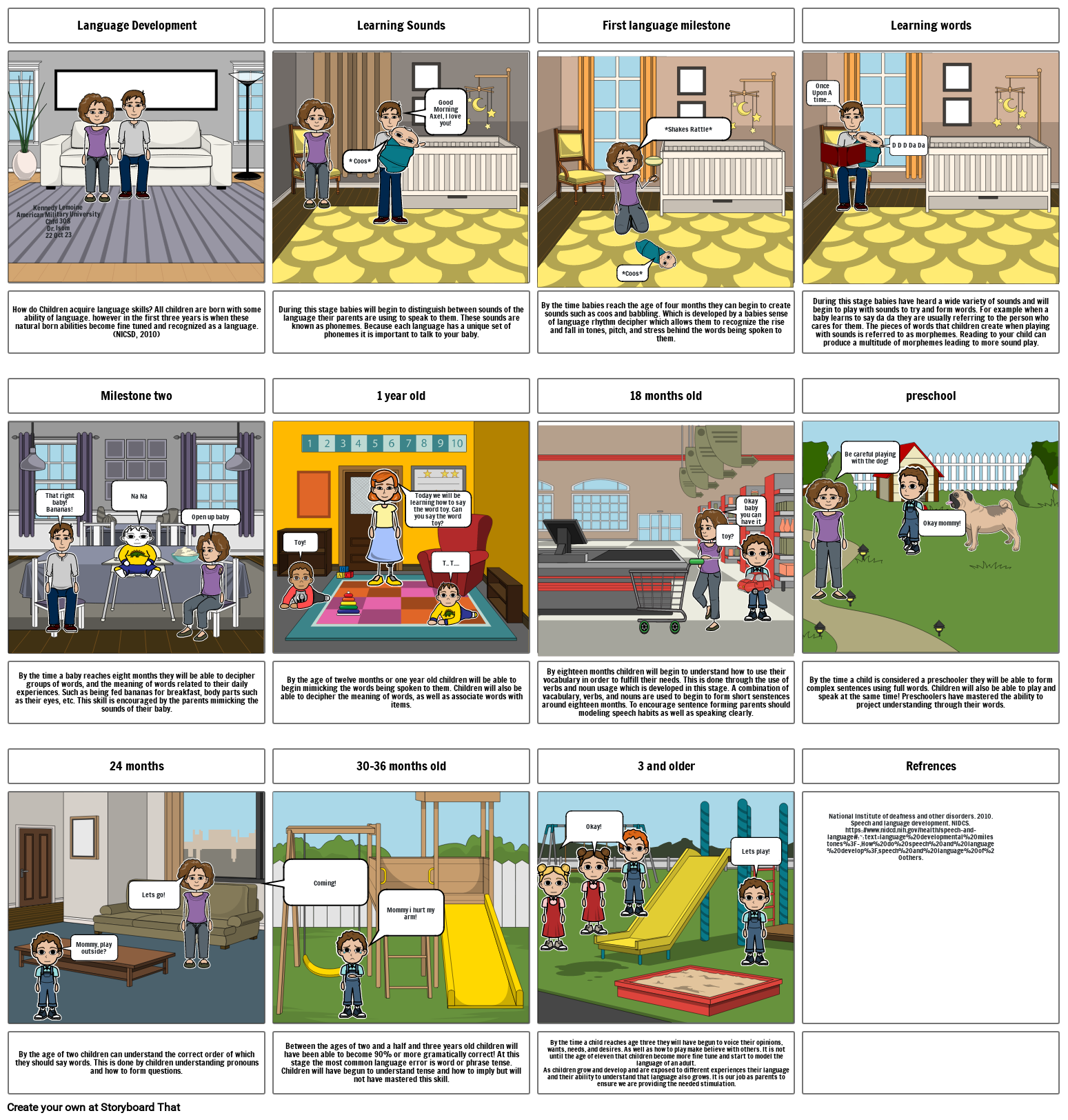child language development

Storyboard Text
- Language Development
- Kennedy LemoineAmerican Military UniversityChfd 308Dr. Isom22 Oct 23
- Learning Sounds
- * Coos*
- Good Morning Axel, I love you!
- First language milestone
- *Shakes Rattle*
- Learning words
- Once Upon A time...
- D D D Da Da
- How do Children acquire language skills? All children are born with some ability of language. however in the first three years is when these natural born abilities become fine tuned and recognized as a language. (NICSD, 2010)
- Milestone two
- During this stage babies will begin to distinguish between sounds of the language their parents are using to speak to them. These sounds are known as phonemes. Because each language has a unique set of phonemes it is important to talk to your baby.
- 1 year old
- By the time babies reach the age of four months they can begin to create sounds such as coos and babbling. Which is developed by a babies sense of language rhythm decipher which allows them to recognize the rise and fall in tones, pitch, and stress behind the words being spoken to them.
- 18 months old
- *Coos*
- During this stage babies have heard a wide variety of sounds and will begin to play with sounds to try and form words. For example when a baby learns to say da da they are usually referring to the person who cares for them. The pieces of words that children create when playing with sounds is referred to as morphemes. Reading to your child can produce a multitude of morphemes leading to more sound play.
- preschool
- Be careful playing with the dog!
- By the time a baby reaches eight months they will be able to decipher groups of words, and the meaning of words related to their daily experiences. Such as being fed bananas for breakfast, body parts such as their eyes, etc. This skill is encouraged by the parents mimicking the sounds of their baby.
- That right baby! Bananas!
- Na Na
- Open up baby
- By the age of twelve months or one year old children will be able to begin mimicking the words being spoken to them. Children will also be able to decipher the meaning of words, as well as associate words with items.
- Toy!
- Today we will be learning how to say the word toy. Can you say the word toy?
- T.. T....
- By eighteen months children will begin to understand how to use their vocabulary in order to fulfill their needs. This is done through the use of verbs and noun usage which is developed in this stage. A combination of vacabulary, verbs, and nouns are used to begin to form short senstences around eighteen months. To encourage sentence forming parents should modeling speech habits as well as speaking clearly.
- toy?
- Okay baby you can have it
- By the time a child is considered a preschooler they will be able to form complex sentences using full words. Children will also be able to play and speak at the same time! Preschoolers have mastered the ability to project understanding through their words.
- Okay mommy!
- 24 months
- Mommy, play outside?
- Lets go!
- Coming!
- 30-36 months old
- Mommy i hurt my arm!
- 3 and older
- Okay!
- Lets play!
- Refrences
- National Institute of deafness and other disorders. 2010. Speech and language development. NIDCS. https://www.nidcd.nih.gov/health/speech-and-language#:~:text=language%20developmental%20milestones%3F-,How%20do%20speech%20and%20language%20develop%3F,speech%20and%20language%20of%20others.
- By the age of two children can understand the correct order of which they should say words. This is done by children understanding pronouns and how to form questions.
- Between the ages of two and a half and three years old children will have been able to become 90% or more gramatically correct! At this stage the most common language error is word or phrase tense. Children will have begun to understand tense and how to imply but will not have mastered this skill.
- By the time a child reaches age three they will have begun to voice their opinions, wants, needs, and desires. As well as how to play make believe with others. It is not until the age of eleven that children become more fine tune and start to model the language of an adult. As children grow and develop and are exposed to different experiences their language and their ability to understand that language also grows. It is our job as parents to ensure we are providing the needed stimulation.
Over 30 Million Storyboards Created

